Understanding megatrends
The analysis from our research partner CIFS sheds light on the structural trends transforming the world, helping us build better investment portfolios.
Pictet Asset Management has been working with the Copenhagen Institute for Futures Studies (CIFS) for over a decade to establish a deeper understanding of megatrends – the powerful secular forces that are changing the environment, society, politics, technology and the economy.
CIFS is a leading global think tank and advisory firm. CIFS uses awide range of research methods, developed over the last 50 years, which include megatrend analysis, scenario planning, risk management, innovation initiatives and strategy development.
Through our partnership with CIFS, we have devised the Pictet Investment Megatrends framework that incorporates 21 identified investment megatrends. The framework – which includes trends such as Urbanisation, AI and Computing Power, Focus on Health, Climate Change and Economic Growth – enhances our thematic equity capabilities and informs the construction and development of our thematic equities strategies such as Water, Robotics or Nutrition.
As CIFS’ partner, Pictet Asset Management has access to research into areas not normally covered by the investment analyst community such as changes in societal attitudes and beliefs, the impact this has on the environment and the business sector, and the acceleration of technological development. We are proud to be associated with CIFS and would like to share some of their research with you.
Download the reports (The reports are only available in english)
Visions of a Connected Future
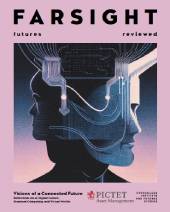
Many wonderful promises are made in the world of technology, but fewer are kept than what the tech evangelists and marketeers of the world would have you think. That doesn’t mean the future will not be interesting. On the contrary, it will most likely be weirder, messier, and more complicated than what we can imagine in the present.
This issue is dedicated to explorations of the future of connectivity. The topics surveyed in the selected articles and interviews include the future of artificial intelligence (both biological and silicon-based), the rise of the ‘cybertariat’, the quest for quantum computing, the digital ad bubble (and why it may soon burst), critical reflections on digital health, the future of neural interfaces, the metaverse, dating in virtual reality, and more.
Entering the New Age of Work
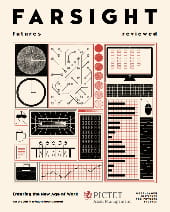
A transformation of work is underway, caused by a perfect storm of converging forces. The most significant driver of change today is the ongoing pandemic, which has provoked what can only be described as a mass psychological shift among both employees and employers worldwide, creating new points of conflict and giving rise to novel ways of working.
In this report, we examine how artificial intelligence and robots will change work and labour markets, and who the winners and losers will be in the globalised and platform-based digital economy. We ask if the open-plan office heading to the grave, if the ‘end of burnout’ is in sight, and whether we might be working in virtual worlds by 2050.
A World Pulled Apart?
.jpg)
It is not difficult to imagine a future of intensified strife and conflict, but is there also a chance for a more stable equilibrium to exist between the world’s powers?
This report is dedicated to examining both the fractures and divisions in an emerging multipolar world order, as well as the prospects for peaceful co-existence. It includes the insights of experts and academics on various geopolitical themes, including the rise of the 'splinternet', the emerging world order and China's place in it, the increasingly adversarial great power politics of both cyberspace and outer space, and how the breakdown of international collaboration in the Arctic heightens the risk of a nuclear ‘time bomb’ scenario.
Futures for the Living World
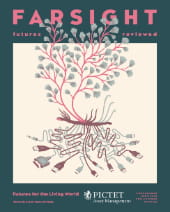
The future of humanity is intimately entangled with and dependent on the prosperity and health of Earth’s ecosystems – for better and worse.
This report explores this connection in depth and examines the risks we take if we do not shift course from exploitation to regeneration. Read about the new frontiers of biomimetics, far-future climate scenarios, geoengineering, ecological forecasting, a future where nature has rights comparable to those of humans, and more. Futures for the Living World is produced by our team of resident futurist with contributions from guest writers and interviews with visionary thinkers, including world-renowned science fiction author Kim Stanley Robinson.
Global megatrends
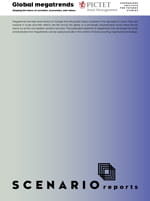
► Read the full report here
Future shaping art / art shaping futures
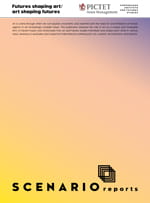
► Read the full report here
Fourth industrial (R)evolution
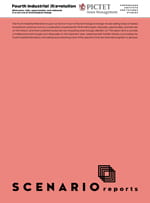
The Fourth Industrial Revolution is upon us. But how much of the technological change we are seeing today is indeed revolutionary and how much is a continuation of past trends? Which blind spots, wildcards, opportunities, and risks are on the horizon, and which potential futures are we not paying close enough attention to?
The report aims to provide a multifaceted and thought-provoking take on this important topic, exploring both familiar themes surrounding the Fourth Industrial Revolution and asking and answering some of the questions that are otherwise forgotten or ignored. ► Read the full report here
Using the future
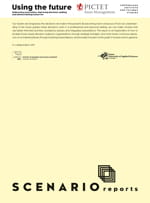
Our futures are shaped by the decisions we make in the present. By becoming more conscious of how our understanding of the future guides these decisions, both in a professional and personal setting, we can make choices that are better informed and less clouded by biases and misguided assumptions.
This report is an exploration of how to enable future-ready decision-making in organisations, through strategic foresight, and more future-conscious decisions on an individual level, through fostering futures literacy and broader inclusion of the public in futures work in general. ► Read the full report here
CSR in the age of compounded crisis
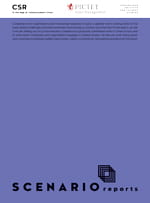
Companies and organisations are increasingly expected to play a greater role in solving some of the major global challenges and interconnected crises facing us. Are they up to the task?
In this report, we ask if we are shifting our focus from reactive compliance to proactive commitment when it comes to how and to what extent companies and organisations engage in societal causes. We discuss what ’doing good’ and corporate social responsibility mean today, outline crucial trends, and explore questions for the future. ► Read the full report here
Pandemics
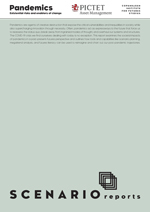
Pandemics are agents of creative destruction that expose the critical vulnerabilities and inequalities in society while also supercharging innovation through necessity. Often, pandemics act as expressways to the future that force us to reassess the status quo, break away from ingrained modes of thought, and overhaul our systems and structures. This report examines the societal impacts of pandemics in a past-present-futures perspective and outlines how tools and capabilities like scenario planning, megatrend analysis, and futures literacy can be used to reimagine and chart out our post-pandemic trajectories. ► Read the full report here
Visions of a greener world
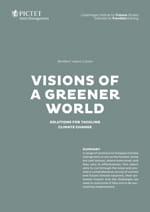
A range of solutions to mitigate climate change exist or are on the horizon. Some are well-known, others more novel, and they vary in effectiveness.
This report aims to cut through the noise and provide a comprehensive survey of current and future climate solutions, their potential impact and the challenges we need to overcome if they are to be successfully implemented.
Your life in 2024
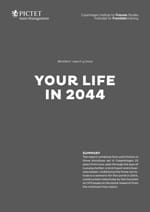
The report combines fact with fiction in three storylines set in Copenhagen 25 years from now, seen through the eyes of a young mother, a lord mayor and a business leader.
Underlying the three narratives is a scenario for the world in 2044, constructed collectively by the futurists at CIFS based on the latest research from the Institute’s key topics.
Rethinking higher education
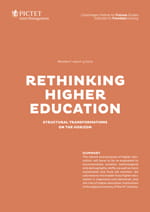
The nature and purpose of higher education will have to be re-evaluated to accommodate societal, technological and demographic shifts, as well as more automated and fluid job markets.
We will have to reconsider how higher education is organised and delivered, and the role of higher education institutions in the digital economy of the 21st century.
Future media
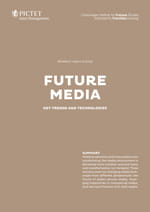
Media production and consumption are accelerating, the media environment is becoming more complex, and junk news and misinformation run rampant.
Three articles cover our changing media landscape from different perspectives: the future of public service media, diverging trajectories in commercial media, and the new frontiers of hi-tech media.
Crumbling pillars
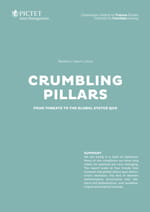
We are living in a time of upheaval. Many of the conditions we have long taken for granted are now changing.
The report looks at four trends that threaten the global status quo: Democratic recession, the end of Western technological dominance and Western-led globalisation, and accelerating environmental change.


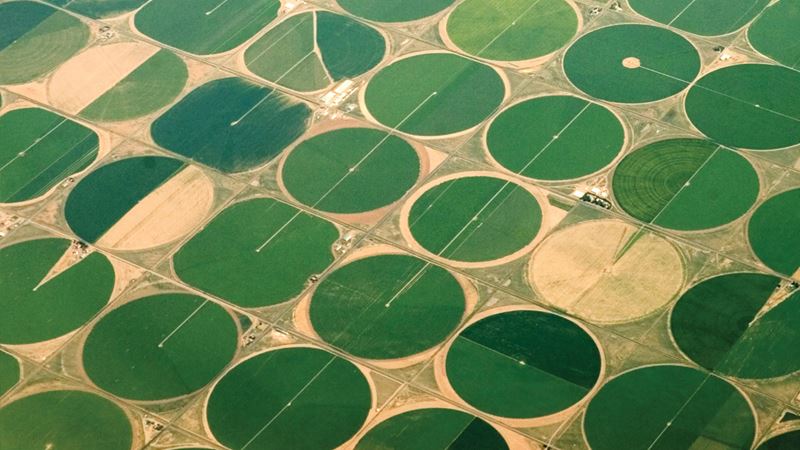

This marketing material is issued by Pictet Asset Management (Europe) S.A.. It is neither directed to, nor intended for distribution or use by, any person or entity who is a citizen or resident of, or domiciled or located in, any locality, state, country or jurisdiction where such distribution, publication, availability or use would be contrary to law or regulation. The latest version of the fund‘s prospectus, Pre-Contractual Template (PCT) when applicable, Key Investor Information Document (KIID), annual and semi-annual reports must be read before investing. They are available free of charge in English on www.assetmanagement.pictet or in paper copy at Pictet Asset Management (Europe) S.A., 15 avenue J.F. Kennedy, L-1855 Luxembourg, or at the office of the fund local agent, distributor or centralizing agent if any. The KIID is also available in the local language of each country where the compartment is registered. The prospectus, the PCT when applicable, and the annual and semi-annual reports may also be available in other languages, please refer to the website for other available languages. Only the latest version of these documents may be relied upon as the basis for investment decisions.
The summary of investor rights (in English and in the different languages of our website) is available here and at www.assetmanagement.pictet under the heading "Resources", at the bottom of the page.
The list of countries where the fund is registered can be obtained at all times from Pictet Asset Management (Europe) S.A., which may decide to terminate the arrangements made for the marketing of the fund or compartments of the fund in any given country.
The information and data presented in this document are not to be considered as an offer or solicitation to buy, sell or subscribe to any securities or financial instruments or services.
Information, opinions and estimates contained in this document reflect a judgment at the original date of publication and are subject to change without notice. Pictet Asset Management (Europe) S.A. has not taken any steps to ensure that the securities referred to in this document are suitable for any particular investor and this document is not to be relied upon in substitution for the exercise of independent judgment. Tax treatment depends on the individual circumstances of each investor and may be subject to change in the future. Before making any investment decision, investors are recommended to ascertain if this investment is suitable for them in light of their financial knowledge and experience, investment goals and financial situation, or to obtain specific advice from an industry professional.
The value and income of any of the securities or financial instruments mentioned in this document may fall as well as rise and, as a consequence, investors may receive back less than originally invested.
The investment guidelines are internal guidelines which are subject to change at any time and without any notice within the limits of the fund's prospectus.
The mentioned financial instruments are provided for illustrative purposes only and shall not be considered as a direct offering, investment recommendation or investment advice. Reference to a specific security is not a recommendation to buy or sell that security. Effective allocations are subject to change and may have changed since the date of the marketing material.
Past performance is not a guarantee or a reliable indicator of future performance. Performance data does not include the commissions and fees charged at the time of subscribing for or redeeming shares.
Any index data referenced herein remains the property of the Data Vendor. Data Vendor Disclaimers are available on assetmanagement.pictet in the “Resources” section of the footer.
This document is a marketing communication issued by Pictet Asset Management and is not in scope for any MiFID II/MiFIR requirements specifically related to investment research. This material does not contain sufficient information to support an investment decision and it should not be relied upon by you in evaluating the merits of investing in any products or services offered or distributed by Pictet Asset Management.
Pictet AM has not acquired any rights or license to reproduce the trademarks, logos or images set out in this document except that it holds the rights to use any entity of the Pictet group trademarks. For illustrative purposes only.